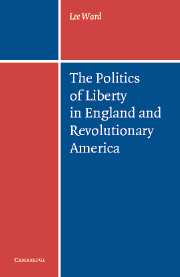Book contents
- Frontmatter
- Contents
- Acknowledgments
- Introduction: Reexamining the Roots of Anglo-American Political Thought
- PART ONE THE DIVINE RIGHT CHALLENGE TO NATURAL LIBERTY
- PART TWO THE WHIG POLITICS OF LIBERTY IN ENGLAND
- 4 James Tyrrell: The Voice of Moderate Whiggism
- 5 The Pufendorfian Moment: Moderate Whig Sovereignty Theory
- 6 Algernon Sidney and the Old Republicanisms
- 7 A New Republican England
- 8 Natural Rights in Locke's Two Treatises
- 9 Lockean Liberal Constitutionalism
- 10 The Glorious Revolution and the Catonic Response
- 11 Eighteenth-Century British Constitutionalism
- PART THREE THE WHIG LEGACY IN AMERICA
- Conclusion
- Bibliography
- Index
11 - Eighteenth-Century British Constitutionalism
Published online by Cambridge University Press: 28 October 2009
- Frontmatter
- Contents
- Acknowledgments
- Introduction: Reexamining the Roots of Anglo-American Political Thought
- PART ONE THE DIVINE RIGHT CHALLENGE TO NATURAL LIBERTY
- PART TWO THE WHIG POLITICS OF LIBERTY IN ENGLAND
- 4 James Tyrrell: The Voice of Moderate Whiggism
- 5 The Pufendorfian Moment: Moderate Whig Sovereignty Theory
- 6 Algernon Sidney and the Old Republicanisms
- 7 A New Republican England
- 8 Natural Rights in Locke's Two Treatises
- 9 Lockean Liberal Constitutionalism
- 10 The Glorious Revolution and the Catonic Response
- 11 Eighteenth-Century British Constitutionalism
- PART THREE THE WHIG LEGACY IN AMERICA
- Conclusion
- Bibliography
- Index
Summary
The British Constitution in the middle of the eighteenth century in many respects attained its historical prime. Looking back on two decades of political stability and economic growth under the pragmatic administration of Walpole and his successors and the final demise of the Jacobite threat on the heath of the windswept fields of Culloden in 1746, the subjects of the now firmly United Kingdom understandably enjoyed a general spirit of contentment and self-congratulation. On the political level, the bitter partisan and theological divisions in the nation during the reigns of William and Anne and the early Hanoverian period were for the most part relegated to an unlamented past. On the intellectual level, the British Constitution reached its zenith in philosophical circles with the praise of observers of such import as David Hume, Montesquieu, and later Sir William Blackstone. The philosophical framework and ideological commitments of the dominant forces in the British political nation during the imperial crisis with America were firmly installed, practically without domestic rival, during this period.
The conservative tendencies present in moderate Whig thought since the Exclusion and Glorious Revolution periods solidified throughout the first half of the century, further marginalizing radical Whig ideas and attaining a degree of theoretical sophistication hitherto unseen. When British political elites and the public faced the challenges of empire posed by American resistance to parliamentary sovereignty in the 1760s and 1770s, they understood the dispute over the order of the empire and the nature of the British Constitution primarily in terms of the philosophical and constitutional principles of moderate Whiggism that achieved ascendancy in Britain throughout the course of the eighteenth century.
- Type
- Chapter
- Information
- The Politics of Liberty in England and Revolutionary America , pp. 305 - 324Publisher: Cambridge University PressPrint publication year: 2004



